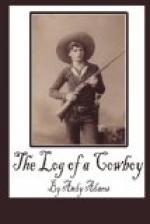After a change of clothes for Quarternight and myself, and rather late dinner for all hands, there yet remained the counting of the herd. The Mexican corporal and two of his men had come over for the purpose, and though Lovell and several wealthy rancheros, the sellers of the cattle, were present, it remained for Flood and the corporal to make the final count, as between buyer and seller. There was also present a river guard,—sent out by the United States Custom House, as a matter of form in the entry papers,—who also insisted on counting. In order to have a second count on the herd, Lovell ordered The Rebel to count opposite the government’s man. We strung the cattle out, now logy with water, and after making quite a circle, brought the herd around where there was quite a bluff bank of the river. The herd handled well, and for a quarter of an hour we lined them between our four mounted counters. The only difference in the manner of counting between Flood and the Mexican corporal was that the American used a tally string tied to the pommel of his saddle, on which were ten knots, keeping count by slipping a knot on each even hundred, while the Mexican used ten small pebbles, shifting a pebble from one hand to the other on hundreds. “Just a mere difference in nationality,” Lovell had me interpret to the selling dons.
When the count ended only two of the men agreed on numbers, The Rebel and the corporal making the same thirty-one hundred and five,—Flood being one under and the Custom House man one over. Lovell at once accepted the count of Priest and the corporal; and the delivery, which, as I learned during the interpreting that followed, was to be sealed with a supper that night in Brownsville, was consummated. Lovell was compelled to leave us, to make the final payment for the herd, and we would not see him again for some time. They were all seated in the vehicle ready to start for town, when the cowman said to his foreman,—
“Now, Jim, I can’t give you any pointers on handling a herd, but you have until the 10th day of September to reach the Blackfoot Agency. An average of fifteen miles a day will put you there on time, so don’t hurry. I’ll try and see you at Dodge and Ogalalla on the way. Now, live well, for I like your outfit of men. Your credit letter is good anywhere you need supplies, and if you want more horses on the trail, buy them and draft on me through your letter of credit. If any of your men meet with accident or get sick, look out for them the same as you would for yourself, and I’ll honor all bills. And don’t be stingy over your expense account, for if that herd don’t make money, you and I had better quit cows.”
I had been detained to do any interpreting needful, and at parting Lovell beckoned to me. When I rode alongside the carriage, he gave me his hand and said,—
“Flood tells me to-day that you’re a brother of Bob Quirk. Bob is to be foreman of my herd that I’m putting up in Nueces County. I’m glad you’re here with Jim, though, for it’s a longer trip. Yes, you’ll get all the circus there is, and stay for the concert besides. They say God is good to the poor and the Irish; and if that’s so, you’ll pull through all right. Good-by, son.” And as he gave me a hearty, ringing grip of the hand, I couldn’t help feeling friendly toward him, Yankee that he was.




